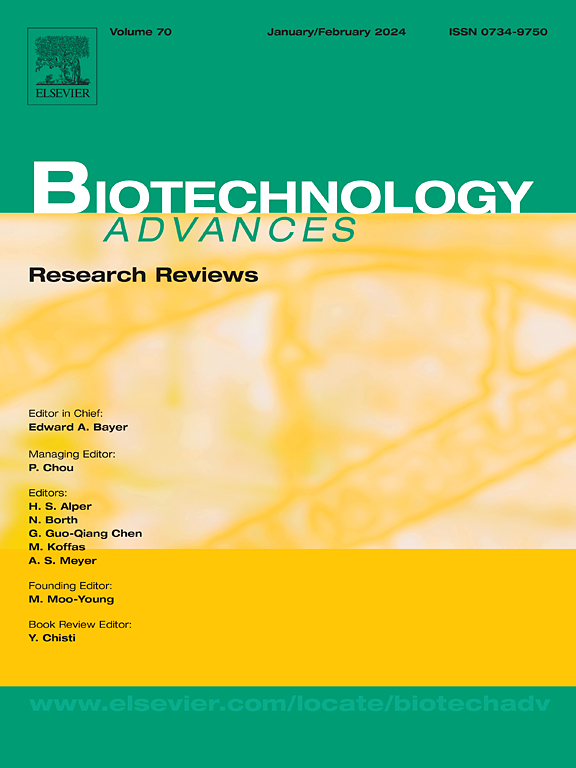Synthetic biology of Fusarium for the sustainable production of valuable bioproducts
IF 12.1
1区 工程技术
Q1 BIOTECHNOLOGY & APPLIED MICROBIOLOGY
引用次数: 0
Abstract
Synthetic biology offers transformative opportunities to optimise Fusarium species as efficient platforms for the sustainable production of diverse bioproducts. Advanced engineering techniques, including CRISPR/Cas9, RNA interference and synthetic promoters, have enhanced the manipulation of metabolic pathways, enabling higher yields of industrially relevant compounds. Recent insights from next-generation sequencing and omics technologies have significantly expanded our understanding of Fusarium's metabolic networks, leading to more precise strain engineering. Despite these advances, challenges such as metabolic bottlenecks, regulatory complexities and strain stability remain significant barriers to industrial-scale applications. The development of efficient genetic tools, together with the expansion of our knowledge of Fusarium physiology and genetics thanks to systems biology approaches, holds promise to unlock Fusarium's full potential as a sustainable cell factory. This review focuses on the genetic and metabolic tools available to enhance Fusarium's capacity to produce biofuels, pharmaceuticals, enzymes and other valuable compounds. It also highlights key innovations and discusses future directions for leveraging Fusarium as an environmentally friendly bioproduction system.
镰刀菌的合成生物学,用于可持续生产有价值的生物产品
合成生物学为优化镰刀菌物种提供了变革的机会,使其成为可持续生产多种生物产品的有效平台。先进的工程技术,包括CRISPR/Cas9、RNA干扰和合成启动子,增强了对代谢途径的操纵,使工业相关化合物的产量更高。新一代测序和组学技术的最新见解大大扩展了我们对镰刀菌代谢网络的理解,从而导致更精确的菌株工程。尽管取得了这些进展,但代谢瓶颈、监管复杂性和菌株稳定性等挑战仍然是工业规模应用的重大障碍。高效遗传工具的发展,以及系统生物学方法对镰刀菌生理学和遗传学知识的扩展,有望释放镰刀菌作为可持续细胞工厂的全部潜力。本文主要综述了提高镰刀菌生产生物燃料、药物、酶和其他有价值化合物的能力的遗传和代谢工具。它还强调了关键的创新,并讨论了利用镰刀菌作为环境友好型生物生产系统的未来方向。
本文章由计算机程序翻译,如有差异,请以英文原文为准。
求助全文
约1分钟内获得全文
求助全文
来源期刊

Biotechnology advances
工程技术-生物工程与应用微生物
CiteScore
25.50
自引率
2.50%
发文量
167
审稿时长
37 days
期刊介绍:
Biotechnology Advances is a comprehensive review journal that covers all aspects of the multidisciplinary field of biotechnology. The journal focuses on biotechnology principles and their applications in various industries, agriculture, medicine, environmental concerns, and regulatory issues. It publishes authoritative articles that highlight current developments and future trends in the field of biotechnology. The journal invites submissions of manuscripts that are relevant and appropriate. It targets a wide audience, including scientists, engineers, students, instructors, researchers, practitioners, managers, governments, and other stakeholders in the field. Additionally, special issues are published based on selected presentations from recent relevant conferences in collaboration with the organizations hosting those conferences.
 求助内容:
求助内容: 应助结果提醒方式:
应助结果提醒方式:


